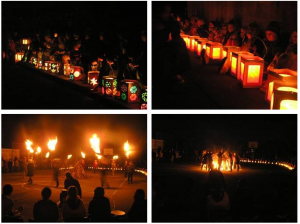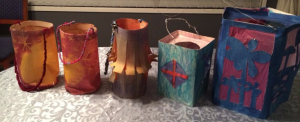Rites of Passage
I am really excited that tomorrow is our daughters Matariki – mid winter festival. This time two years ago I wrote an article for the Teachers Matter Magazine about the power of having rites of passage built within the school system.
Here is an extract from that article…
Last term my daughter’s school celebrated the winter solstice, the shortest day of the year, with a lantern festival – as they do every year. Each student made a lantern and the entire school community gathered on the green at the bottom of the school. The junior students walked in line, creating a spiral, holding their brightly lit lanterns while everyone sang. As the sun went down everyone made their way up the hill to the top of the school. The driveway was lined by the middle school children – each holding their creatively designed lanterns to show the way. At the top quad we all gathered around an unlit bonfire. A procession of senior students in their last year of school entered the quad and slowly circled the bonfire with fiery torches and ceremonially set it alight. In silence, the students and parents watch it burn for 10-15 mins, songs were sung, fire pois twirled and then we all walked back to our respective classrooms. The teacher tells a story followed by soup and bread rolls – provided by the parents. Finally, we all quietly leave and enjoy the peaceful walk back down the hill.
This is the sixth year we have participated in this beautiful festival and it struck me how many layers of development are evident and the rites of passage that encompass the evening.
Each classes lanterns get more and more sophisticated over the years to match the skill and maturation of the students, right through to the ultimate rite of lighting the bonfire. Our daughter could see how far she has come on her journey in school and see where she is heading.
Two years on from that article I am reminded of the fact the each year we have had a similar, heart breaking, conversation. It goes like this…
Daughter: “I don’t want to go to the festival”
Me: “And why is that?”
Daughter: “‘cos my lantern is stupid”
Me; “I’m sure it is beautiful”
Daughter: “It is not as good as all the others – it’s stupid!”
Me: “I will love it- let’s go”
Now truth be told, her lantern is not as intricate as some of the other students in her class, and it is still great. I can see that she has worked hard to make it and most importantly done her best. No matter what I say to boost her self-esteem, she knows it is not as good as some of the others.
Of course, the learning here is that we all have different skill sets, and develop at differing rates and as individuals this is perfect. Furthermore, comparing yourself to others is futile. It offers no support at any level to boost your self esteem. Perhaps more importantly the lantern actually offers the opportunity to see her own growth and development over time.
Here’s why I’m excited!
For the first time in 8 years she is excited about the festival – and wants to show me her lantern – I have not heard any negative words, and the conversation is about how last year she lead the spiral and next year she will be able to design her lantern – freestyle! Plus she is looking forward to the day she will be able to light the bonfire.
I’m excited because the attitude has changed – Like all Mum’s I will love her lantern tomorrow – and as an educator I realise it is NOT about the lantern – what I LOVE so much more that she is blossoming…
Maybe being 12 years old is a time when children start looking forward – I guess it is a transition time in physical development – so maybe the same is true for metacognition. I am going to have to explore this idea further…
Another example of this occurred recently… Last week our daughter was required to present her project to the class and according to the teacher she stood up and confidently and clearly shared her research – a huge turn around from a year ago, when she stood up, shrugged her shoulders and sat down. Today she commented that when she is in Class 12 (year 13) she will have to give a 20 minute presentation (about her individual year long project of her choice) and I do believe that she can now see this being a successfully possibility.
In contrast, our son, attending a different school, gave a speech each year for 5 years, for no apparent reason, or authentic context, except that it was to enter the ‘speech competition.’ Over a five year period, the speeches didn’t get any better, nor did his confidence (even with his Mother as his coach!)
I love the idea of these rites of passage and marker posts for children to be able to stop and see where they have been and where they are going. Maybe it provides some security of knowing what lies ahead is not so scary, and that the processes in place are there to slowly prepare them for these milestones.
How does your curriculum, festivals and events show students the pathway they are heading on? In what ways does your curriculum spiral, in authentic contexts, to prepare children for the next steps? How do your students see there growth over time? A few ideas to think about..
Like the cheese commercial says: Good things take time…
Tags: growth over time, Rites of Passage
Published on Wednesday, June 18th, 2014, under Curriculum design, Transformational Learning



Great blog Karen. I love the link between the connected spiral of learning that is so empowering of personal growth and the rite of passage.
You have me thinking about the way in which The rite of passage is a special opportunity to reflect on the past and look forward to what is ahead. An event that marks this passage in life gives it significance and authenticity for those involved. What fascinates me is that it was a period of 5 years of making this connection and seeing the spiral develop that eventually led to how she sees her contribution now and in the future. While I am sure there will be significant implications in regard to the meta cognitive development (age and stage) it also reinforces the potential impact of long term opportunity to build on the connections from one year to the next. This post has me reflecting on the significance of the spiral of growth over time that is celebrated with such ceremony …..the way it marks the learning from the past and looks to the possibilities of the future – such a powerful and memorable moment in time. I do so much work with schools in developing connected and spiralling authentic learning opportunities …. I really Need to consider how the significance of rites of passage can be developed to enhance and value each stage in the journey. Thanks for sharing your thoughts… Powerful as always!
I really wish every teacher could experience the simplicity of the Rudolf Steiner school system – Simplicity with much though and sophistication that is appears so natural and seemless… even how they teach reading – small steps and children go from being a non reader to reading chapter books in what appears almost overnight – and never bring a book home to read – it really intrigues me… I also think it has some real implications for the work you do in the curriculum mapping area – the spirals of milestones…
A rite of passage is a joyful thing and one that we always treasure. It’s like going to camp – I remember the passage of where we stayed and for how long.
As a team I think we need to think what rites we have for milestones of maturity.
Ha Wendy – I read that as you spending lots of time in the passage (hallway) !! Yes camp can be one of those milestones but only if it is done in total integration of the authentic curriculum… what traditions do you have at your school and how could they be adapted to show growth with age and stage milestones…
Thank you Karen for putting so clearly one if the dear reasons I love our school! Good to be reminded ! Beautifully written too
Thanks Debi – Every year I see the unfolding and the complexity of structure – yet it seems so simple from the outside!